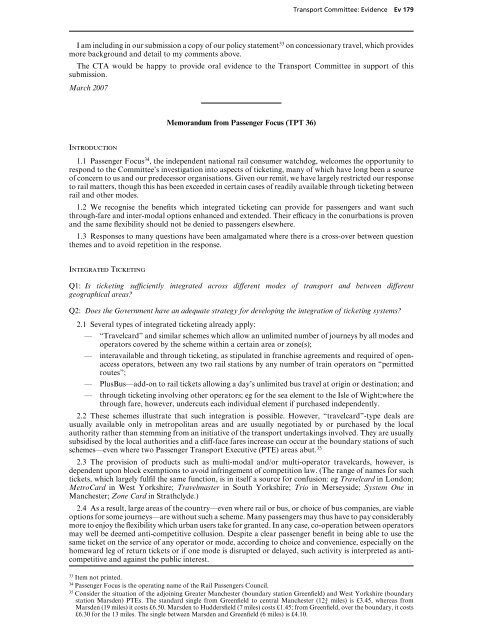Ticketing and Concessionary Travel on Public Transport - United ...
Ticketing and Concessionary Travel on Public Transport - United ...
Ticketing and Concessionary Travel on Public Transport - United ...
You also want an ePaper? Increase the reach of your titles
YUMPU automatically turns print PDFs into web optimized ePapers that Google loves.
<strong>Transport</strong> Committee: Evidence Ev 179<br />
I am including in our submissi<strong>on</strong> a copy of our policy statement 33 <strong>on</strong> c<strong>on</strong>cessi<strong>on</strong>ary travel, which provides<br />
more background <str<strong>on</strong>g>and</str<strong>on</strong>g> detail to my comments above.<br />
The CTA would be happy to provide oral evidence to the <strong>Transport</strong> Committee in support of this<br />
submissi<strong>on</strong>.<br />
March 2007<br />
Introducti<strong>on</strong><br />
Memor<str<strong>on</strong>g>and</str<strong>on</strong>g>um from Passenger Focus (TPT 36)<br />
1.1 Passenger Focus 34 , the independent nati<strong>on</strong>al rail c<strong>on</strong>sumer watchdog, welcomes the opportunity to<br />
resp<strong>on</strong>d to the Committee’s investigati<strong>on</strong> into aspects of ticketing, many of which have l<strong>on</strong>g been a source<br />
of c<strong>on</strong>cern to us <str<strong>on</strong>g>and</str<strong>on</strong>g> our predecessor organisati<strong>on</strong>s. Given our remit, we have largely restricted our resp<strong>on</strong>se<br />
to rail matters, though this has been exceeded in certain cases of readily available through ticketing between<br />
rail <str<strong>on</strong>g>and</str<strong>on</strong>g> other modes.<br />
1.2 We recognise the benefits which integrated ticketing can provide for passengers <str<strong>on</strong>g>and</str<strong>on</strong>g> want such<br />
through-fare <str<strong>on</strong>g>and</str<strong>on</strong>g> inter-modal opti<strong>on</strong>s enhanced <str<strong>on</strong>g>and</str<strong>on</strong>g> extended. Their eYcacy in the c<strong>on</strong>urbati<strong>on</strong>s is proven<br />
<str<strong>on</strong>g>and</str<strong>on</strong>g> the same flexibility should not be denied to passengers elsewhere.<br />
1.3 Resp<strong>on</strong>ses to many questi<strong>on</strong>s have been amalgamated where there is a cross-over between questi<strong>on</strong><br />
themes <str<strong>on</strong>g>and</str<strong>on</strong>g> to avoid repetiti<strong>on</strong> in the resp<strong>on</strong>se.<br />
Integrated <str<strong>on</strong>g>Ticketing</str<strong>on</strong>g><br />
Q1: Is ticketing suYciently integrated across diVerent modes of transport <str<strong>on</strong>g>and</str<strong>on</strong>g> between diVerent<br />
geographical areas?<br />
Q2: Does the Government have an adequate strategy for developing the integrati<strong>on</strong> of ticketing systems?<br />
2.1 Several types of integrated ticketing already apply:<br />
— “<str<strong>on</strong>g>Travel</str<strong>on</strong>g>card” <str<strong>on</strong>g>and</str<strong>on</strong>g> similar schemes which allow an unlimited number of journeys by all modes <str<strong>on</strong>g>and</str<strong>on</strong>g><br />
operators covered by the scheme within a certain area or z<strong>on</strong>e(s);<br />
— interavailable <str<strong>on</strong>g>and</str<strong>on</strong>g> through ticketing, as stipulated in franchise agreements <str<strong>on</strong>g>and</str<strong>on</strong>g> required of openaccess<br />
operators, between any two rail stati<strong>on</strong>s by any number of train operators <strong>on</strong> “permitted<br />
routes”;<br />
— PlusBus—add-<strong>on</strong> to rail tickets allowing a day’s unlimited bus travel at origin or destinati<strong>on</strong>; <str<strong>on</strong>g>and</str<strong>on</strong>g><br />
— through ticketing involving other operators; eg for the sea element to the Isle of Wight;where the<br />
through fare, however, undercuts each individual element if purchased independently.<br />
2.2 These schemes illustrate that such integrati<strong>on</strong> is possible. However, “travelcard”-type deals are<br />
usually available <strong>on</strong>ly in metropolitan areas <str<strong>on</strong>g>and</str<strong>on</strong>g> are usually negotiated by or purchased by the local<br />
authority rather than stemming from an initiative of the transport undertakings involved. They are usually<br />
subsidised by the local authorities <str<strong>on</strong>g>and</str<strong>on</strong>g> a cliV-face fares increase can occur at the boundary stati<strong>on</strong>s of such<br />
schemes—even where two Passenger <strong>Transport</strong> Executive (PTE) areas abut. 35<br />
2.3 The provisi<strong>on</strong> of products such as multi-modal <str<strong>on</strong>g>and</str<strong>on</strong>g>/or multi-operator travelcards, however, is<br />
dependent up<strong>on</strong> block exempti<strong>on</strong>s to avoid infringement of competiti<strong>on</strong> law. (The range of names for such<br />
tickets, which largely fulfil the same functi<strong>on</strong>, is in itself a source for c<strong>on</strong>fusi<strong>on</strong>: eg <str<strong>on</strong>g>Travel</str<strong>on</strong>g>card in L<strong>on</strong>d<strong>on</strong>;<br />
MetroCard in West Yorkshire; <str<strong>on</strong>g>Travel</str<strong>on</strong>g>master in South Yorkshire; Trio in Merseyside; System One in<br />
Manchester; Z<strong>on</strong>e Card in Strathclyde.)<br />
2.4 As a result, large areas of the country—even where rail or bus, or choice of bus companies, are viable<br />
opti<strong>on</strong>s for some journeys—are without such a scheme. Many passengers may thus have to pay c<strong>on</strong>siderably<br />
more to enjoy the flexibility which urban users take for granted. In any case, co-operati<strong>on</strong> between operators<br />
may well be deemed anti-competitive collusi<strong>on</strong>. Despite a clear passenger benefit in being able to use the<br />
same ticket <strong>on</strong> the service of any operator or mode, according to choice <str<strong>on</strong>g>and</str<strong>on</strong>g> c<strong>on</strong>venience, especially <strong>on</strong> the<br />
homeward leg of return tickets or if <strong>on</strong>e mode is disrupted or delayed, such activity is interpreted as anticompetitive<br />
<str<strong>on</strong>g>and</str<strong>on</strong>g> against the public interest.<br />
33 Item not printed.<br />
34 Passenger Focus is the operating name of the Rail Passengers Council.<br />
35 C<strong>on</strong>sider the situati<strong>on</strong> of the adjoining Greater Manchester (boundary stati<strong>on</strong> Greenfield) <str<strong>on</strong>g>and</str<strong>on</strong>g> West Yorkshire (boundary<br />
stati<strong>on</strong> Marsden) PTEs. The st<str<strong>on</strong>g>and</str<strong>on</strong>g>ard single from Greenfield to central Manchester (12² miles) is £3.45, whereas from<br />
Marsden (19 miles) it costs £6.50. Marsden to Huddersfield (7 miles) costs £1.45; from Greenfield, over the boundary, it costs<br />
£6.30 for the 13 miles. The single between Marsden <str<strong>on</strong>g>and</str<strong>on</strong>g> Greenfield (6 miles) is £4.10.

















